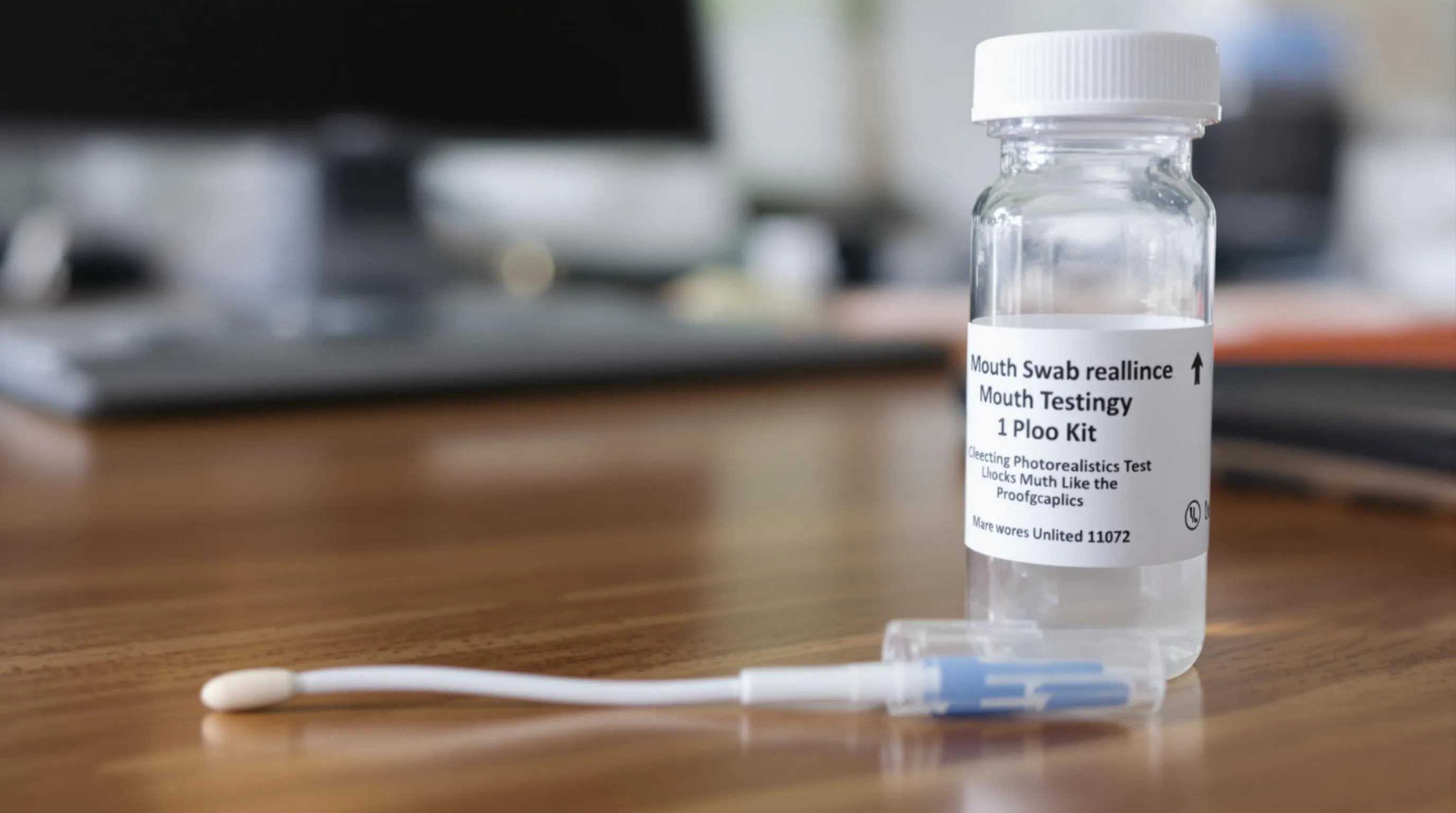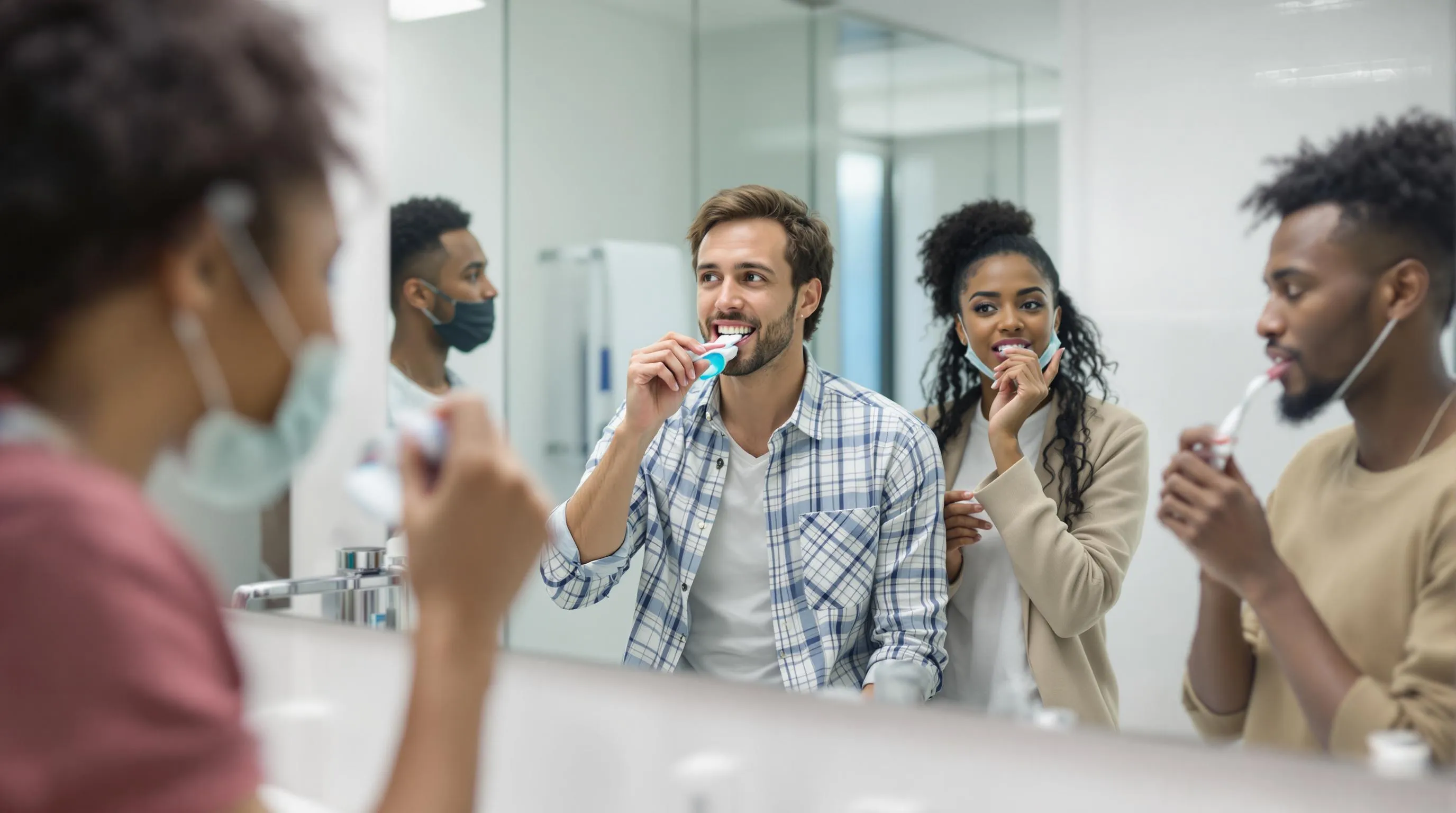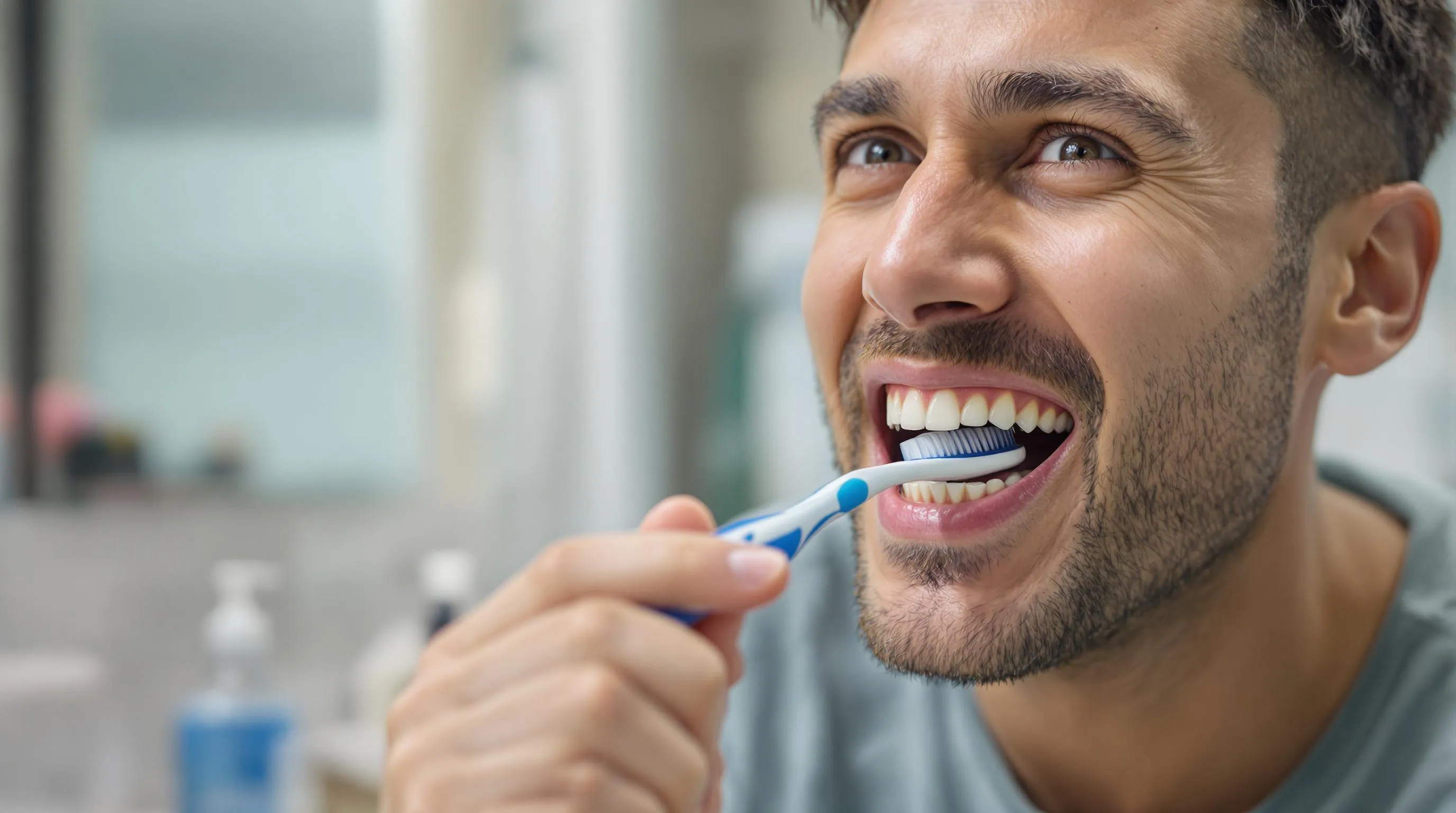Picture this: you've landed your dream job, but there's one final hurdle standing between you and that first paycheck – a mouth swab drug test. Unlike urine or hair tests, saliva screenings can detect recent substance use within hours or days, making them increasingly popular among employers who want accurate, immediate results.
With mouth swab tests screening for everything from THC and cocaine to amphetamines and opiates, understanding how these oral fluid examinations work becomes crucial for your career success. The good news? These tests are actually more predictable than you might think, with specific detection windows and preparation strategies that can significantly impact your results.
Whether you're facing pre-employment screening or routine workplace testing, knowing the right preparation techniques can make all the difference in securing your professional future.
What Is a Mouth Swab Drug Test?
A mouth swab drug test, also known as an oral fluid test or saliva drug test, is a screening method employers use to detect the presence of drugs or their metabolites in your saliva. This testing approach collects oral fluid samples using an absorbent pad or swab that's placed between your lower cheek and gums or under your tongue to gather sufficient saliva for analysis.
The test typically screens for seven common substances that employers want to identify:
- Cannabis (THC)
- Cocaine
- Opiates
- Amphetamines
- Methamphetamine
- Phencyclidine (PCP)
- Alcohol
Geared towards efficiency, rapid saliva drug tests yield results within minutes. Employers widely use this testing method in workplaces for random drug testing or post-accident testing because it provides quick insights into recent drug use patterns.
According to Khazanov GK's 2023 research study, oral fluids drug testing demonstrates high specificity rates of 93-100% but shows variable sensitivity ranging from 21-93%. The test detects methadone and oxycodone most effectively at 93% accuracy, followed by cocaine, while showing poorer detection rates for amphetamine and opiates at 21%. Cannabis detection proved inadequate in the study's findings.
Understanding how to pass a mouth swab test for job applications becomes crucial when you consider that these tests focus on detecting very recent substance use. Unlike urine or hair tests that can detect drug use from weeks or months prior, saliva tests typically identify substances used within the past 24-48 hours, making them particularly effective for employers who want to screen for impairment during work hours.
The collection process takes less than five minutes and doesn't require privacy or special facilities, which explains why many employers prefer this method over traditional urine testing. Your saliva sample gets analyzed immediately using rapid testing technology, allowing hiring managers to receive results before making final employment decisions.
How Mouth Swab Tests Work in Employment Settings
Mouth swab tests collect saliva samples through a simple swabbing process that targets the inside of your cheeks, under your tongue, and around your gums. Employers prefer this method because it provides immediate results and detects recent substance use with high accuracy rates. If you need to pass a test fast, the following guide has proven to be successful: how to pass a mouth swab drug test in 12 hours
Detection Windows for Common Substances
Different substances remain detectable in your saliva for varying timeframes after use. Understanding these detection windows helps you prepare effectively when you're learning how to pass a mouth swab test for job applications.
THC demonstrates the longest detection period at 72 hours maximum, making it the most challenging substance to clear from your system before testing. Cocaine and other stimulants typically clear within 24-48 hours, while opiates like heroin show the shortest detection window at approximately 1 hour post-use.
Your individual metabolism affects these timeframes significantly. Heavy users face extended detection periods compared to occasional users due to substance accumulation in oral tissues.
Factors Affecting Test Accuracy
Several variables influence mouth swab test reliability and your ability to achieve passing results. Research from Khazanov GK's 2023 study reveals that oral fluid drug testing shows high specificity rates of 93-100% but variable sensitivity ranging from 21-93%.
Test-Related Factors:
- Laboratory quality and testing facility standards impact result precision
- On-site testing versus laboratory analysis affects accuracy levels
- Equipment sensitivity determines minimum detectable substance concentrations
- Proper collection technique ensures adequate sample quality
Individual Factors:
- Drug quantity consumed directly correlates with detection likelihood
- Frequency of use creates cumulative effects in your saliva
- Your metabolic rate influences how quickly substances clear your system
- Oral hygiene practices affect residual drug presence in your mouth
Environmental Factors:
- Time elapsed since last substance use remains the primary determinant
- Food and beverage consumption before testing can dilute sample concentration
- Saliva production levels impact drug concentration ratios
The study found methadone and oxycodone detection achieved 93% accuracy, while cocaine detection reached similar levels. Amphetamine and opiate detection proved less reliable at 21% accuracy rates. Cannabis detection showed inadequate results across testing scenarios.
Tester skill level significantly impacts collection quality and result reliability. Trained professionals follow standardized protocols that ensure consistent sample collection, while inexperienced collectors may compromise test integrity through improper technique.
Preparing for Your Employment Drug Test
Effective preparation for your employment mouth swab test requires strategic planning and understanding the limited detection window these tests operate within. Your success depends on implementing the right techniques at best times based on how much advance notice you receive. If you need proven results to pass a drug test, check out the how to pass a drug test guide.
Timeline-Based Preparation Strategy
72+ Hours Before Test
Abstain from all substances completely during this period. The 2-3 day window provides the most reliable approach to pass a mouth swab test for job applications, as this timeframe exceeds the typical detection window for most substances.
24-72 Hours Before Test
Focus on intensive oral hygiene routines and hydration. Brush your teeth, gums, and tongue every 4-6 hours. Rinse with antiseptic mouthwash or diluted hydrogen peroxide solutions to reduce residual particles in oral crevices.
12-24 Hours Before Test
Increase saliva production by chewing sugar-free gum consistently. Consume citrus fruits or sour candies to elevate mouth acidity levels, which may interfere with metabolite detection accuracy.
2-12 Hours Before Test
Maintain continuous hydration by drinking water regularly. Avoid dairy products, poppy seeds, and alcohol during this critical window. These substances can potentially interfere with test results or contribute to false positives.
30 Minutes Before Test
Carry out final preparation techniques including hydrogen peroxide mouth rinses for 30-second intervals. Chew minty gum or consume breath mints to stimulate fresh saliva production immediately before testing.
Essential Steps Before the Test
Oral Hygiene Optimization
Execute thorough dental care routines targeting all mouth surfaces where drug particles accumulate. Brush teeth, gums, cheeks, tongue, and roof of mouth using fluoride toothpaste. Floss carefully around the gumline where residues commonly collect.
Hydration Protocol
Consume 8-10 glasses of water daily leading up to your test. Proper hydration supports natural detoxification processes and helps dilute potential drug concentrations in saliva. Avoid excessive water intake immediately before testing to prevent discomfort.
Dietary Considerations
Eliminate foods that may trigger false positives or interfere with test accuracy. Avoid poppy seed products for 48 hours before testing. Reduce fatty food consumption as these can increase metabolite concentrations in oral fluids.
Timing Coordination
Schedule your test preparation activities to align with the natural saliva production cycle. Morning tests typically show lower drug concentrations due to overnight oral cavity clearance. Coordinate your final preparation steps within the 30-minute window before sample collection.
Stress Management
Maintain composure during the preparation period and testing process. Anxiety can affect saliva production and test administration. Practice relaxation techniques to ensure best conditions for sample collection and accurate results.
Proven Methods to Pass a Mouth Swab Test
Effective strategies for how to pass a mouth swab test for job screenings combine multiple approaches that target drug metabolites in your saliva. These methods work best when implemented together as part of a comprehensive preparation plan.
Oral Hygiene Techniques
Thorough oral hygiene forms the foundation of successful mouth swab test preparation. Brush your teeth vigorously multiple times, targeting all surfaces including gums, tongue, cheeks, and the roof of your mouth. Floss carefully to remove any trapped particles near the gumline where drug residues often accumulate.
Rinse your mouth with alcohol-based antiseptic mouthwash such as Listerine for 30 seconds at least 3-4 times before testing. Diluted hydrogen peroxide serves as an effective alternative rinse that can interfere with drug detection mechanisms. Perform these rinses immediately before your test for maximum impact.
Use a tongue scraper to remove additional buildup from the tongue surface. Focus extra attention on areas where the swab typically makes contact during collection - the inner cheeks, under the tongue, and around the gum areas.
Hydration and Dietary Considerations
Maintain consistent water intake for at least 12 hours before your test to support natural saliva dilution and detoxification processes. Drink 8-10 glasses of water throughout this period to reduce drug metabolite concentrations in your oral fluid.
Chew sugar-free gum or strong citrus-flavored varieties to stimulate increased saliva production. Fresh saliva helps flush out older fluid containing higher concentrations of drug metabolites. Mint-flavored options work particularly well for changing your mouth's chemical environment.
Consume sour candies like lemon drops or citrus varieties 30-60 minutes before testing. These acidic foods increase saliva acidity levels, making drug detection more difficult for testing equipment. Stop eating solid foods at least 1-2 hours before your scheduled test time.
Avoid dairy products, alcohol, and poppy seed-containing foods for 24-48 hours before testing, as these items can interfere with accurate results or trigger false positives.
Detox Products and Their Effectiveness
Specialized detox mouthwashes designed for oral drug tests can temporarily mask or reduce detectable drug metabolites in saliva. These products typically remain effective for 30-60 minutes after use, requiring precise timing coordination with your test schedule.
Most detox mouthwashes contain ingredients like ascorbic acid to oxidize drug metabolites, glycerin to assist in toxin elimination, and witch hazel for oral cavity cleansing. Follow manufacturer instructions exactly - missing steps or incorrect timing reduces product effectiveness significantly.
Research indicates that detox products work best when combined with natural preparation methods rather than used alone. The 2023 Khazanov study showed oral fluid testing sensitivity ranges from 21-93% depending on the substance, suggesting that multiple preparation approaches increase your chances of favorable results.
Purchase detox products from reputable retailers and read consumer reviews to identify reliable brands. Online marketplaces offer various options, but verify product authenticity and check expiration dates before use. Remember that no detox product guarantees success - abstinence remains the most reliable method for how to pass a mouth swab test.
Home Remedies and Natural Methods
Home remedies offer accessible approaches to how to pass a mouth swab test for job screening when combined with strategic preparation. These natural methods work by altering saliva composition and reducing detectable drug metabolites through scientifically-backed techniques.
Safe and Effective Options
Oral Hygiene Enhancement forms the foundation of effective preparation. Brush your teeth thoroughly 3-4 times daily, focusing on gums, tongue, and inner cheeks to remove drug residues from oral tissues. Floss between teeth to eliminate trapped particles and rinse with antiseptic mouthwash containing alcohol-based ingredients that neutralize metabolites.
Saliva Production Stimulation dilutes drug concentrations naturally. Chew citrus or cinnamon-flavored gum for 15-20 minutes before testing to increase saliva flow and alter oral chemistry. Suck on sour citrus candies to raise saliva acidity levels, making drug detection more difficult through pH manipulation.
Hydrogen Peroxide Rinse temporarily breaks down drug metabolites when used correctly. Mix 3% hydrogen peroxide with equal parts water and swish for 30 seconds immediately before testing. Spit out completely without swallowing, as this solution can reduce THC levels to undetectable amounts for short periods.
Strategic Hydration maintains best saliva composition. Drink 8-10 glasses of water in the hours leading up to your test to flush toxins from your system. Avoid dehydrating beverages like coffee, alcohol, or black tea that concentrate metabolites in your saliva.
High-Fat Food Consumption traps THC molecules before they reach your saliva. Eat greasy foods like burgers, pizza, or fried items 2-3 hours before testing. Fat molecules bind with THC metabolites and redirect them to your digestive system instead of remaining in oral fluids.
Methods to Avoid
Unverified Quick Fixes lack scientific support and often prove ineffective. Avoid swabbing your mouth with milk, vinegar alone, or unusual substances that have no evidence-based backing for drug test success.
Physical Test Tampering creates serious consequences beyond test failure. Don't attempt to damage the swab device, provide fake samples, or manipulate the testing equipment, as these actions result in immediate disqualification and potential legal issues.
Excessive Chemical Use damages oral tissues and raises suspicion. Overusing harsh substances like undiluted bleach, pure vinegar, or excessive amounts of hydrogen peroxide can harm your mouth and alert testing administrators to tampering attempts.
Dehydration Tactics concentrate drug metabolites rather than eliminate them. Avoiding all fluids before testing actually increases the likelihood of detection by creating concentrated saliva samples with higher drug levels.
Last-Minute Panic Methods often backfire during testing situations. Excessive tooth brushing immediately before the test, gargling with unusual substances, or attempting to produce no saliva can delay testing and create additional scrutiny from administrators.
Day-of-Test Strategies
Day-of-test strategies focus on maximizing your chances of success through immediate preparation techniques that work within hours of your mouth swab test. These methods complement your pre-test preparation and target the final window when drug metabolites are still detectable in your saliva.
What to Do in the Final Hours
Rinse your mouth thoroughly with hydrogen peroxide diluted with water in a 50/50 ratio 15-30 minutes before your test to reduce drug residue in saliva. This oxidative rinse helps break down metabolites that might otherwise trigger a positive result.
Brush your teeth and gums multiple times in the hours leading up to your test, paying special attention to areas under your tongue and around your cheeks where drug traces accumulate. Focus on thorough cleaning of all oral surfaces, including your gums, tongue, and the inside of your cheeks.
Chew sour or citrus-flavored gum or candies to increase saliva acidity and production, which dilutes drug concentration and interferes with test accuracy. The increased acidity creates an environment less conducive to detecting drug metabolites while the enhanced saliva flow helps flush residual substances.
Stay hydrated by drinking water regularly, but avoid overhydration as excessive fluid intake could appear suspicious to test administrators. Proper hydration helps dilute any remaining drug metabolites in your oral fluids.
Consider using detox mouthwashes designed specifically to mask drugs temporarily, applying them according to package instructions shortly before testing. These products work by coating the mouth and temporarily reducing the concentration of detectable substances.
Avoid consuming any medication or substances for at least 48-72 hours before testing, as recent use is exactly what oral swabs detect most effectively. Even prescription medications can sometimes trigger false positives or interfere with test results.
Perform repeated oral hygiene steps throughout the final hours, including brushing, flossing, and using antiseptic mouthwash rinses. The repetitive cleaning helps ensure maximum removal of drug residues from all oral surfaces.
Use acidic rinses such as diluted lemon juice or apple cider vinegar as natural alternatives to help cleanse oral fluids. These home remedies work by altering the pH environment in your mouth, potentially affecting metabolite detection.
Managing Test Anxiety
Prepare by understanding the test process so you know exactly what to expect and can reduce nervousness about the unknown aspects of mouth swab testing. Familiarizing yourself with the procedure helps eliminate uncertainty that contributes to test anxiety.
Engage in deep breathing and calming exercises to lower stress hormone levels that can affect your saliva composition and flow rate. Controlled breathing techniques help maintain composure and ensure adequate saliva production during the test.
Map out your oral hygiene routine in advance to build confidence in your preparation strategy. Having a clear plan reduces last-minute panic and ensures you complete all necessary steps systematically.
Get enough sleep the night before your test and avoid last-minute panic to help maintain composure during the actual testing process. Adequate rest supports your body's natural functions and helps you think clearly under pressure.
Practice relaxation techniques such as progressive muscle relaxation or meditation to manage stress levels effectively. Lower stress improves your focus on executing your preparation steps and maintains best saliva flow during testing.
Understand that stress can reduce saliva flow, which might actually help dilute drug concentrations but could also make sample collection more difficult. Managing anxiety ensures you can produce adequate saliva when required while maintaining the best possible test conditions.
Understanding Your Test Results
Mouth swab tests detect recent drug use from saliva samples collected from inside the mouth, mainly screening for substances like THC from marijuana. A positive result indicates drug presence during the detection window, usually 1–3 days.
What Happens If You Fail
Failing a mouth swab test triggers immediate consequences that vary based on your employer's policies and the type of position you're seeking. Pre-employment screening failures typically result in job offer withdrawal, with 45% of workplace drug test failures occurring in 2019 according to recent industry data.
Current employees face disciplinary action ranging from mandatory counseling programs to immediate termination. Companies operating under federal regulations or Department of Transportation guidelines enforce stricter protocols, often requiring suspension pending further evaluation.
Your employment status determines the severity of consequences you'll encounter. Probationary employees experience termination more frequently than tenured staff members. Safety-sensitive positions including transportation, healthcare, and construction carry zero-tolerance policies due to liability concerns.
Federal employees receive specific protections under civil service regulations, including due process rights and appeal procedures. These protections don't apply to private sector workers, who face at-will employment consequences.
Documentation of your test failure becomes part of your employment record, potentially affecting future job opportunities within the same organization. Some employers share testing results through industry databases, impacting your ability to secure similar positions elsewhere.
Next Steps and Options
Request a retest or confirmatory testing if you suspect errors or false positives in your initial screening. Laboratory mistakes occur in approximately 2-5% of all drug tests, making verification requests reasonable and often successful.
Contest the results through your company's formal grievance process if one exists. Present evidence of prescription medications, medical conditions, or procedural violations that might explain positive results. Document all interactions with supervisors and HR representatives throughout this process.
Seek legal counsel to understand your rights and potential defenses, especially if test procedures or results appear questionable. Employment attorneys specialize in workplace drug testing cases and can evaluate whether proper protocols were followed during your screening.
Review your employer's drug testing policy to understand available options for rehabilitation or second chances. Many companies offer employee assistance programs that provide treatment opportunities instead of termination for first-time offenders.
Maintain comprehensive documentation if you're contesting results, including medical records, prescription information, and witness statements about testing procedures. This evidence becomes crucial if you pursue legal action or formal appeals.
Consider voluntary rehabilitation programs even if your employer doesn't require them. Proactive treatment demonstrates responsibility and may influence decision-makers during disciplinary proceedings or future employment applications.
Knowing your legal rights and employer policies remains essential for navigating test outcomes effectively. The best strategy for learning how to pass a mouth swab test for job screenings remains abstinence, as other methods provide only temporary or uncertain effects.
Conclusion
Successfully passing a mouth swab test for job applications requires strategic preparation and understanding of the detection window. The most reliable approach remains complete abstinence from substances 72 hours before your test, as oral fluid screening detects recent drug use within this timeframe.
Your preparation strategy combines multiple proven techniques that work together to boost success. Intensive oral hygiene practices including thorough brushing, flossing, and rinsing with antiseptic mouthwash create the foundation for passing results. Maintaining proper hydration dilutes saliva concentration while stimulating natural saliva production through sugar-free gum helps replace potentially contaminated oral fluids.
Detox mouthwashes provide temporary masking effects for drug metabolites but don't guarantee results when used independently. These products work most effectively when combined with comprehensive oral hygiene and proper timing strategies. Hydrogen peroxide rinses offer additional cleansing benefits when applied 30-60 minutes before testing.
Understanding your employer's testing policies and detection windows gives you crucial advantages in preparation timing. THC remains detectable for up to 72 hours while cocaine and amphetamines typically clear within 24-48 hours. Individual factors including metabolism rate, frequency of use, and oral health significantly impact these timeframes.
Natural methods including increased saliva acidity through sour candies and strategic dietary choices complement your primary preparation approach. But, these techniques provide limited effectiveness compared to abstinence and proper oral hygiene protocols.
Remember that failing a mouth swab test carries serious employment consequences including job offer withdrawal or disciplinary action. Document your preparation efforts and maintain awareness of your rights about retesting procedures and appeals processes. Professional legal counsel becomes valuable if you face unexpected positive results even though proper preparation.
Your success depends on combining proven preparation methods with realistic timeline expectations. Start your preparation as early as possible and avoid relying solely on last-minute masking attempts that provide unreliable results.



